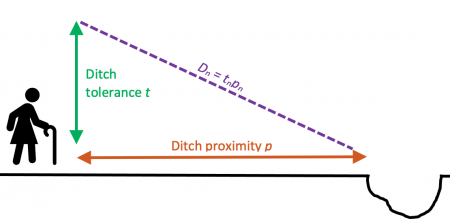Ditch tolerance: Difference between revisions
Jump to navigation
Jump to search
Amwelladmin (talk | contribs) No edit summary |
Amwelladmin (talk | contribs) No edit summary |
||
| (2 intermediate revisions by the same user not shown) | |||
| Line 1: | Line 1: | ||
{{a|negotiation|}}One’s basic preparedness to die in a ditch. This generally is inversely proportional to one’s [[ditch proximity|proximity to the ditch]] in question. If it the landscape appears flat, with not so much as a subtle impression as far as the eye can see in any direction, not crossing, or climbing back out of, that ditch is a matter of existential importance. When one is in it, less so. Thus the art of negotiation, in one sense, if steering the discussion into as many of your | {{a|negotiation|[[File:Ditch tolerance.png|450px|frameless|center]]}}One’s basic preparedness to die in a ditch. This generally is inversely proportional to one’s [[ditch proximity|proximity to the ditch]] in question. If it the landscape appears flat, with not so much as a subtle impression as far as the eye can see in any direction, not crossing, or climbing back out of, that ditch is a matter of existential importance. When one is in it, less so. Thus the art of negotiation, in one sense, if steering the discussion into as many of your counterpart’s ditches as you can find. Note: since there is no underlying transaction, it is all-but impossible to fall into an actual ditch when drafting an industry standard template, unless it is created by a regulatory change. | ||
{{Sa}} | {{Sa}} | ||
*[[Ditch proximity]] | |||
*[[Tedium quotient]] | *[[Tedium quotient]] | ||
*[[I’m not going to die in a ditch about it]] | *[[I’m not going to die in a ditch about it]] | ||
*[[Writing for a judge]] | *[[Writing for a judge]] | ||
{{c|tedium}} | {{c|tedium}} | ||
Latest revision as of 09:59, 29 June 2021
|
Negotiation Anatomy™

|
One’s basic preparedness to die in a ditch. This generally is inversely proportional to one’s proximity to the ditch in question. If it the landscape appears flat, with not so much as a subtle impression as far as the eye can see in any direction, not crossing, or climbing back out of, that ditch is a matter of existential importance. When one is in it, less so. Thus the art of negotiation, in one sense, if steering the discussion into as many of your counterpart’s ditches as you can find. Note: since there is no underlying transaction, it is all-but impossible to fall into an actual ditch when drafting an industry standard template, unless it is created by a regulatory change.